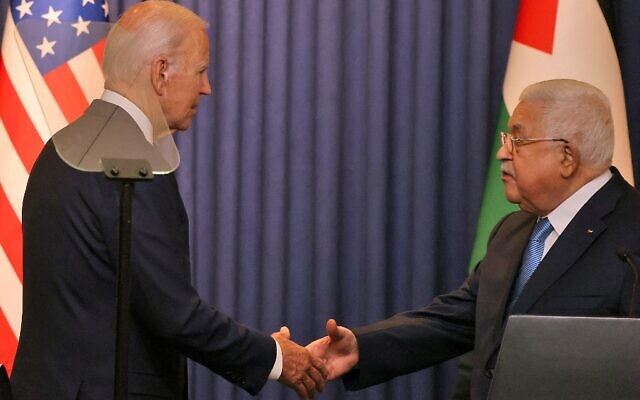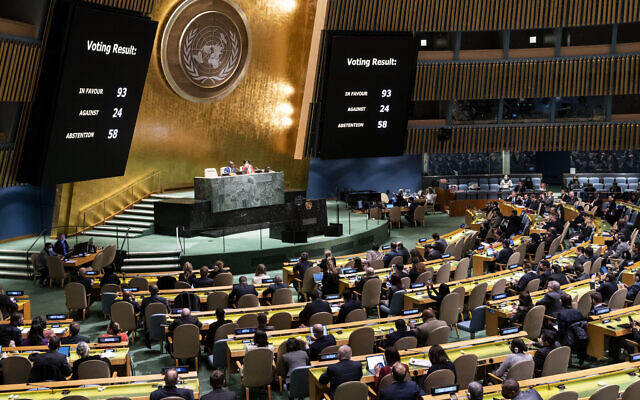Palestinian Ambassador to the United Nations Riyad Mansour is once again seeking full member state status at the UN, but Ramallah faces an uphill battle without support from the US, which has passed laws aimed at thwarting such an effort.
In an interview with The Times of Israel Monday, Mansour argued that the new initiative would “save the two-state solution” and serve as a counterweight to unilateral steps taken by Israel in East Jerusalem and the West Bank that have damaged prospects for the framework to eventually be implemented.
“Maybe it will help Israel by waking up its leaders to hold negotiations,” Mansour said.
The Palestinian envoy maintained that granting the State of Palestine full member status would also be consistent with the Biden administration’s policy to advance “practical measures” aimed at creating more fertile ground for a two-state solution in the absence of negotiations between the parties on final status issues.
But he recognized that convincing the US and other Security Council members to advance the initiative to the General Assembly for a vote would take much work.
Get The Times of Israel's Daily Edition by email and never miss our top stories
Given the political sensitivity of such a move, Mansour refused to offer a timeline for when his office would formally submit a resolution to the Security Council, saying the Palestinians were still in consultations with various member states and that they would advance the measure “whenever we feel that the situation is ripe.”
This is not Ramallah’s first attempt to become a full UN member state. Palestinian Authority President Mahmoud Abbas submitted an application to obtain the status in 2011, but the effort didn’t get past the Security Council, largely due to opposition from the Barack Obama administration.

Palestinian Ambassador to the United Nations Riyad Mansour speaks during a UN Security Council meeting concerning the violence at the border of Israel and the Gaza Strip, at United Nations headquarters, May 15, 2018 in New York City. (Drew Angerer/Getty Images/AFP)
Longstanding US policy has maintained that granting the Palestinians membership to UN agencies that recognize their state on East Jerusalem, the West Bank and the Gaza Strip would serve as a counterproductive end-around to negotiations with Israel.
Abbas sufficed with seeking observer state status, which was overwhelmingly granted in 2012 by the General Assembly. The move was largely symbolic, but it has led to the Palestinians joining over 100 international treaties and conventions as a state party.
A year earlier, however, the United Nations Educational, Scientific and Cultural Organization (UNESCO) voted to grant membership to the State of Palestine. This triggered Congressional legislation that required the severing of US funding to the agency.
Former president Donald Trump pulled the US out of UNESCO entirely in 2019 over its purported anti-Israel bias, but his successor Joe Biden has taken steps to rejoin the agency in order to counter China’s influence. Democrats in Congress, at his direction, have advanced a measure that would allow for the US to rejoin UNESCO, conditioned on the Palestinians not joining additional UN bodies.
Congress over the years has added clauses to annual budget legislation, which would strip the Palestinian Authority of US aid if it obtains UN member status.
The US stopped giving direct aid to the PA in 2014, and redirected its funding to US-run humanitarian projects on the ground as well as to the UN agency for Palestinian refugees, UNRWA.
Biden has announced roughly half a billion dollars in such aid since taking office and that assistance would not likely be impacted if the Palestinians gained full member status.

US President Joe Biden and Palestinian Authority President Mahmoud Abbas shake hands after their statements to the media at the Muqataa Presidential Compound in the city of Bethlehem in the West Bank on July 15, 2022. (Ahmad Gharabli/AFP)
The same cannot be said regarding US aid to the UN. The Foreign Relations Authorization Act passed in 1990 bars US funding “for the United Nations or any specialized agencies thereof which accords the Palestine Liberation Organization the same standing as member states.”
Mansour maintained that US legislation refers to the PLO, whereas his office is the representative body of the State of Palestine. However, the US doesn’t recognize Palestine as a state. The 2012 UN General Assembly resolution granting Ramallah “non-member observer State status” stipulated that its mission would be referred to as Palestine, but this would not be with “prejudice to the observer status and functions of the PLO within the United Nations.”
Joel Braunold who serves as managing director of the Washington-based S Daniel Abraham Center for Middle East Peace, argued that “broader relaxing of congressional restrictions when it comes to the Palestinians and the UN has not been forthcoming.”
Nonetheless, Mansour appeared optimistic about his initiative’s prospects, noting that Abbas has raised the matter with foreign leaders over the past several months, including Biden, France President Emmanuel Macron and King Abdullah of Jordan.
The ambassador himself penned a letter to UN Secretary-General Antonio Guterres in which he raised the issue. A spokesperson for Guterres said Tuesday that “the issue of who gets to be a member state is one for member states themselves to decide.”
Mansour said “there will be close to 180 countries, if not more, that will be happy to accept admitting us as a full member state,” adding that his colleagues on the Security Council have responded “excitedly” to the initiative as well.

A completed resolution vote tally to affirm the suspension of the Russian Federation from the United Nations Human Rights Council is displayed during a meeting of the United Nations General Assembly, Thursday, April 7, 2022, at United Nations headquarters. (AP Photo/John Minchillo)
“They have been frustrated by the deadlock in which they reiterate the right things but don’t see positive change on the ground. They see this as an initiative that could create a new, positive dynamic,” he said.
As for Biden, the Palestinian ambassador said he did not respond in real time when Abbas presented the initiative during their meeting in Bethlehem last month. “I don’t know what was in his mind, but he did not say ‘no’ outright,” Mansour said, adding that his US counterparts informed him that they were studying the proposal.
“The US is not resorting to practical steps to stop Israel from acting unilaterally in changing the reality on the ground in a negative way, especially in the field of settlements,” he said. “So if you are not stopping Israel from destroying the two-state solution before our eyes, then why don’t you look in a positive way at an idea that contributes to saving the two-state solution, which is the official policy of the United States?”
A spokesperson for the State Department told The Times of Israel that while the US remains committed to the two-state solution and is seeking to bring Palestinians and Israelis closer to that goal, “the only realistic path to a comprehensive and lasting peace that ends this conflict permanently is through direct negotiations between the parties.
“There are no shortcuts to Palestinian statehood outside direct negotiations between the parties,” the spokesperson added in response to a query on whether the Biden administration supports the Palestinian bid to obtain full member status at the UN.


